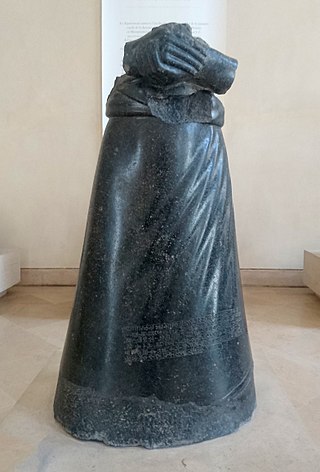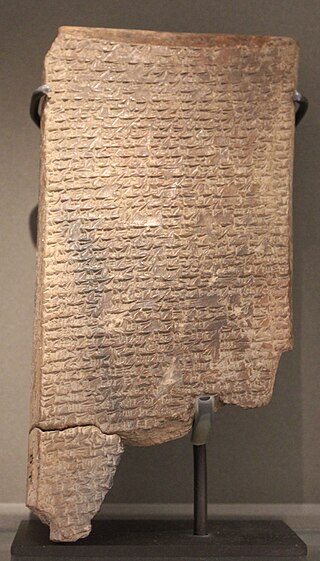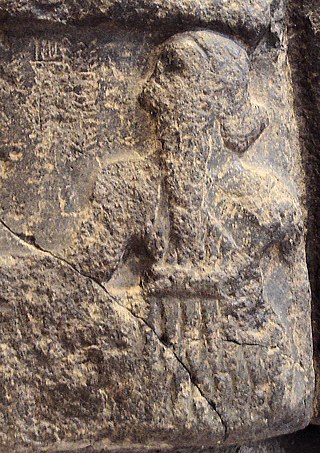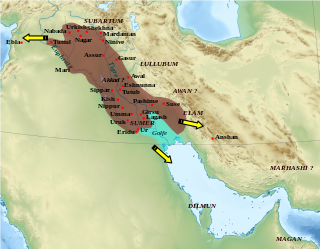| Line | Akkadian (romanized) | English translation [7] |
|---|
| First strophe |
|---|
| 1 | et,-lu-um ru-i-isz a-na i-li-szu i-ba-ak-ki u2-te-ne-en-ne-en iq-[bi? …] szu | A young man was weeping to his god like a friend, constantly praying, he [...] his [...] |
| 2 | ha-mi-it, li-ib-bu-usz du-ul-la-szu ma-ru-is,!?-ma | His heart was aflame, his toil grim. |
| 3 | i-ta-a'-da-ar ka-ba-at-ta-szu i-ni-in-hi | His liver was grieving from its suffering. |
| 4 | i-ni-isz-ma ik-ta-mi-us i-pa-al-si20-ih | He is bent over in suffering; he is prostrate. |
| 5 | ik-pi2-us,!?-ma um-ma du-ul-la-szu ba-ka-i-isz iq-ra-ab | His toil has become too heavy for him, he has drawn near to weep. |
| 6 | ki-ma bu-ri-im pa-ar-si-im ša i-me-ri i-na-ag-ga-ag | He brays like the weaned foal of a donkey, |
| 7 | iš-ta-pu ma-ha-ar i-li-[im] reši-[…]-šu | He has got loud in the god's presence, his chief, |
| 8 | ri-mu-um pu-šu-u2 la-al-la-ra-ma ri-gi-im-[š] | A bull is his speech, [his] voice two lamenters, |
| 9 | be-li-iš-šu qu2-ba-am ub-ba-la ša-ap-ta-aš-[šu] | His lips bear a lament to his lord. |
| Second strophe |
|---|
| 10 | be-li-iš-šu du-ul-li ih-bu-tu i-ma-an-nu | He recounts to his lord the toil he has gone through, |
| 11 | in-hu i-na-hu-u2 i-pa-aš-ša-ar et,-lu-um | The man explains the suffering he is enduring: |
| 12 | be-li-am-ta-al-ka-am-ma i-na ka-ba-at-ti-ia | "My lord, I have reflected within my reins, |
| 13 | […] i li-ib-bim še-et, i-pu-šu la i-di | [...] in [my] heart. I do not know what sin I have committed. |
| 14 | […] an-zi-il-la-ka a-na-ku ik-ki-ba-am le-em-na-ma am-ma-[…] ar | Have I [eaten] a very evil forbidden fruit? |
| 15 | u2-ul da-[a]-gi-il a-hu [a]-hi-iš-šu ka-ar-s,i2 ib-ri-im ib-ra-šu la a-ki-il | Does brother look down on brother? |
| 16 | u2-ul […] an-ni […] na šu ša-ap-li-ka be-lu bi-it ri-a-ši-im | [...] has not [...] me, [...] beneath you, the lord of the house of rejoicing [...] |
| Third strophe |
|---|
| 17 | ši-mi-[…] pi […] ra-na-ba-iz-za be-lu mi-ša-ri mu-[ši?-im?] | [...] there is present for me the lord of justice who decrees [...] |
| 18 | […] i […] am-ma li-ib-ba-šu na-as-qu2-um li | [...] may his choice intelligence [...] |
| 19 | […] i […] ra-ma-an-šu us,-s,u2-ra a-na | [...] to guard himself for [...] |
| 20 | […] tu […]-ni-tu-a ti-ib-ta | [...] my [...] |
| 21 | […]-še ša ku-[… tu]-ul-li-da-an-ni u3 be-[…] | [...] [you] begot me and [...] |
| Fourth strophe |
|---|
| 22 | [...] x-ar a-ta-szu-x [...] | [...] I got distressed [...] |
| 23 | [...] ki-ma sza x pa?-[...] ri-sze-pi2 x... | [...] like/when [...] |
| 24 | UR? x iq-ta-ti ka-ba-at-ti szi? ma x […] da?-ar U4-mi-ia | my spirit came to an end, [...] of my days. |
| 25 | [isz-tu s,]e-eh,2-re-ku a-di ra-bi-ya-ku ur-ri im-ma-ti mu-[…] | [From] my childhood to my maturity, the days have lengthened |
| 26 | [im-ma]-ti ma-la tu-da-mi-qa2-an-ni-ma ma-la tur-tab-ba […] la am-szi | ? |
| Fifth strophe |
|---|
| 27 | i-na x du-um-qi2 tu-ka-al-li-ma lu-um-na be-li-ma x tu-sza-an-me-er iq-[qi2]-ib-bi | In [...] of grace you have shown me evil, my lord, you have caused [...] it will be said. |
| 28 | ru-ub-bu mu-usz-qi2 sze-pi2-isz wa-ta-ti-ma me-eh,2-s,e-tim […] ma-h,i-ia | My misfortune has increased, it attaches itself to [my] feet, [it has inflicted] blows upon me. |
| 29 | pi2ya-am-ma at-ta tu-ma-ar-ri-ra-am da-an-ni-isz […] x-tu-szu i-wi da-da-ar-szu | You are making the mouth (filled with food) bitter to me, its [...] ha become like stinkwort. |
| 30 | […] tu-ur2-ri-x ta-ad-lu-uh,-ma-mi pi2-isz-ri […]-wi-ir isz-tu s,e2-eh,-re-ku | You have [...], you have muddied the water, [...] since my childhood. |
| 31 | […] x-le-et sza-di-i asz-x-mu lu-u2 mu-ri-da la i-szu-ni | [...] the side of the mountain, [...] the ascent has no descent. |
| Sixth strophe |
|---|
| 32 | […] x ta-ka-qa2-ar-szu tu-szu-mi-da sze-pi2-ia | [...] You have set my feet on the earth. |
| 33 | […] x-asz-szi-sza-e-li tu-sza-az-ni-in a-ta | [...] you have made to bear, you have made my [...] care for me. |
| 34 | […] tu-sza-am-li | [...] you have filled up. |
| 35 | […] pi2-sza-tim ta-ag-ru-un | [...] you have heaped up. |
| 36 | […] bi-ti-ia a-bi mu-ti ki-im-ti-ia | [...] of my house, my father, the man of my clan. |
| 37 | [… wa?]-ar-di-szu | [...] of his slave. |
| 38 | […] x-szu | [...] his [...]" |
| Seventh strophe |
|---|
| 39 | […] | [...] |
| 40 | […] x-ar-ki-isz | ? |
| 41 | […] x-ra-ah,-ku | ? |
| 42 | […] x-ar-szu tu-ma-i-szu | [...] him [...] his [...] |
| 43 | […] x-szu-li-wa-szu ka-qa2-ar-szu | [...], he raised him to the earth. |
| 44 | […] ta-x […] sza-ma-an a-si-im | [...] with a physician's oil. |
| 45 | […] a-ak-la u3 li-bi-us-su2 ik-tu-um | [...], he [gave] food and his garments. |
| 46 | […] x-s,u2-um-ma li-ib-ba-su2 u2-sza/ta?-an-me-er | [...], he cheered his spirit. |
| 47 | i-ta-u2-szu ta-ap-sze-h,a-at t,u2-ub szi-ri-szu | and spoke to him of the relief his good health (would bring)." |
| Eighth strophe |
|---|
| 48 | ši-ib-bu-uk e-de-el li-ib-bu-uk la i-le-em-mi-in | "Gird your loins, do not be dispirited, |
| 49 | ga-am-ra ša-na-tu u4-mu ša am-la-u2-ni du-ul-la | the years are finished, the days I filled with toil. |
| 50 | šu-um-ma-ma-an la qa2-bi-ya-at a-na ba-la-t,i-im | If you had not been ordained to life, |
| 51 | ki-ma-ma-an te-le-'i di-ya-am ka-ab-ta ku-ul-la-ti-iš-šu ta-aš-du-ud | how possibly could you have suffered the severe malady to its end? |
| 52 | ta-mu-ur pu-usz-qa2-am i-s,a-bi ka-li-ma | You experienced distress, but my [...] is withdrawn: |
| 53 | tu-usz-ta-ag-me-er-ma bi-il-ta-szu ka-bi-it-ta ta-asz-szi | You have borne its heavy load to its completion. |
| 54 | isz-ti-i-qu2-uk pa-da-nu-um pe2-ti-i-ku | People have [...]ed you, but [now] the way is open for you, |
| 55 | isz-ra-at-ku t,u2-du-um u3 sza-ki-in-ku re-mu-um | Your path is straight and compassion is bestowed on you, |
| 56 | ah,-re-ti-isz u4-mi la ta-ma-asz-szu-u2 il-ka | You who in future days will not forget [your] god, |
| 57 | ba-ni-ka ki ta-da-am-mi-qu2-nim a-at-ta | Your creator, and that you are well favored. |
| Ninth strophe |
|---|
| 58 | a-na il-ka ba-nu-uk tu-ku-ul-tu-uk | I am your god, your creator, your help. |
| 59 | e-ru-kum ma-as,-s,a-ru-ia u3 da-an-nu-ku-[um] | My guards are watching over you with power for your [protection]. |
| 60 | a-sza3 ma-ar-qi2-us-su2 i-pe2-et-ti-[ku-um] | I will open for you a place of refuge, |
| 61 | a-pa-al-la-asz-ku-um-ma da-ri-isz ba-la-t,a-[am] | eternal life I will provide for you. |
| 62 | u3 a-at-ta e-te-ep-s,i ub-bu-la-am pu-szu-usz | As for you, unblenchingly anoint the parched, |
| 63 | em-s,a szu-ki-il szi-qi2 s,a-mi-ia ma-mi | feed the hungry, give water to the thirsty to drink. |
| 64 | u3 sza usz-pu-ma isz-ta-ab-bu-ba i-[…] | But he who has cast sorceries, [whose] [...] have [...], |
| 65 | li-it,-t,u2-ul ak-li-isz-ka li-zu-ub li-h,u-ur u3 li-ih,-[h,a-ra-mi-it,] | May he stare at your food as he melts, flows down and dis[solves]. |
| 66 | pa-ti-ye-et-ku a-bu-ul szu-ul-mi-im u3 ba-la-t,i-im | For you the gate of prosperity and life is open, |
| 67 | mu-um-ma qe2-er-bu-usz e-ru-ub s,i-i lu sza-al-ma-a-at | [...] go in and out of it and prosper." |
| Tenth strophe |
|---|
| 68 | szu-sze-er pa-da-nu-usz pe2-te t,u2-du-usz un-ne-en a-ar-di-ka li-ri-id a-na li-bi-ka | Make straight his way, open his path, may the prayer of your servant sink into your mind. |
| 69 | ka-al-ba-nu-um | Kalbanum |












